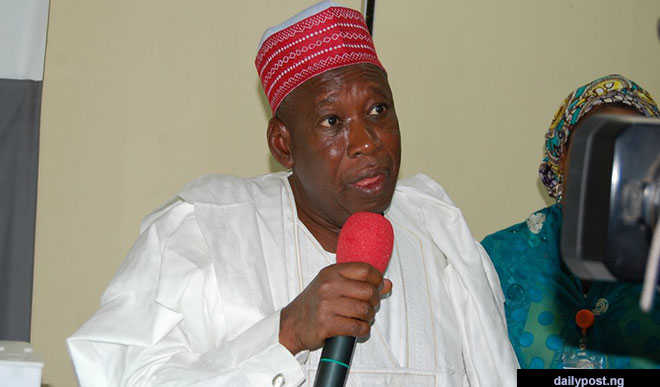Kano organizes week-long events to boost education
In a quest to overcome challenges militating against education sub-sector at basic level, Kano State government has organized a Basic Education Week. The programme with the theme ‘Education for all; a responsibility for all,’ commenced on Sunday, February 5, 2017. Addressing a press conference on the first day of the event, the state Deputy Governor, […]


In a quest to overcome challenges militating against education sub-sector at basic level, Kano State government has organized a Basic Education Week.
The programme with the theme ‘Education for all; a responsibility for all,’ commenced on Sunday, February 5, 2017.
Addressing a press conference on the first day of the event, the state Deputy Governor, Professor Hafiz Abubakar said the education week was organized in order to identify challenges affecting education at the basic level and map out modalities to address them.
Professor Abubakar said the Ganduje-led administration had achieved a lot in the area of education, hence, organized the meeting to assess itself, saying “we intend to identify the areas we have done well and where we are lagging behind so that we can adjust accordingly. The programme will also underscore the importance of basic education as the bedrock of all levels of education and affirm the need for community participation.”
He said the present administration was committed to education “and that is why it cannot joke with any aspect of it.”
The deputy governor said in its bid to promote professionalism in the education sub-sector, the state government had sponsored 2,000 in-service teachers to obtain their National Certificate of Education (NCE).
The teachers were inaugurated yesterday and would soon be posted to various public primary and junior secondary schools across the state, he added.
He said: “This is out of the 25,000 unqualified teachers that are currently undergoing NCE and Post Graduate Diploma in Education programmes under the government’s sponsorship.”
Also part of the education week, the state Governor, Dr. Abdullahi Umar Ganduje met with 1,000 selected head teachers, 10 zonal education secretaries, 44 executives of the Parents Teachers Association (PTA), all the local governments’ education secretaries in the state and other education stakeholders where they discussed issues related to education.
Speaking at the meeting, Governor Ganduje disclosed that the state government had accessed N1.75bn as Universal Basic Education (UBE) counterpart funds from the Universal Basic Education Commission (UBEC) in the last 18 months.
“The money was spent in renovation of classroom blocks, building libraries, drilling of boreholes and provision of furniture to 15, 000 pupils. The move was necessary because the administration inherited dilapidated and inadequate classrooms, insufficient toilet facilities and furniture. We only met 198, 832 pupil’s desks in public schools as against 914, 000 required in the schools.
“In addition to all these, instructional materials were inadequate in the schools while staff morale was at its lowest ebb. In fact, about 50% of teachers were unqualified,” Ganduje lamented.
He said to address the problems squarely, Education Promotion Committees (EPCs) were established in the 44 local government areas of the state and N10m was allocated to each of them for the purpose of boosting education at the local level.
He said out of the N440m released to the committees, 490 blocks consisting 981 classrooms were rehabilitated while 7,915 3-seater desks and various instructional materials were provided to some selected public schools.
Ganduje added that besides that amount which was released for one year, local communities contributed over N800, 000, 000 which was also utilized in providing infrastructural development in many schools across the state.
“Apart from what government provided for the EPCs, various communities contributed the sum of N811, 533, 981 which was used to execute the rehabilitation of 151 blocks of 301classrooms, construction of 291 classrooms, provision of 6,985 3–seater pupils desks and various other facilities such as boreholes and instructional materials,” he said.
In order to boost the morale of the teachers, the governor said the state had ensure prompt payment of their salaries and allowances, stating that between January and December, 2016 over N31bn was paid to 60, 000 teaching and non-teaching staff as salaries and allowances.
The governor also pointed out that his administration had accorded priority to teachers’ capacity building, through workshops and training, while plans were in the pipeline to effect their promotion, which has been stalled for some years.
He said: “The Teacher Upgrade Training Programme was envisioned to serve as an instrument for transforming instructional delivery system through acquisition of teacher professional qualifications and upgrading teachers’ capacities for higher performance and better learning outcome.”
Also speaking, the Emir of Kano, Muhammad Sanusi II advised the state government to explore the financial instrument of Sukuk, the Islamic equivalent of bonds, to finance projects in the education sector of the state.
Sanusi said that the viability of the instrument was demonstrated by Osun state government, which was the only state in Nigeria that raised a Sukuk bond worth billions of naira from the capital market to fund educational development.
“The funds were used to finance construction of education projects, among other development initiatives, and I think it holds potential for states like Kano”, the emir stated.
Turning to the graduating teachers, Sanusi charged them to be focused and dedicated, saying the Kano Emirate Council had identified with the state government in its stride to turn around the education sector.
Some head teachers and stakeholders including Professor Aisha Abdul Isma’il, Professor M.B. Shitu, Kabiru Fagge and Sani Umar Mika’il, stressed the need for the state government to pay more attention to girl-child education, teachers’ welfare and provision of toilet facilities especially in the highly populated schools.
